Removal Procedure
- Disconnect the battery negative cable. Refer to
Battery Replacement
in Engine Electrical.
- Remove the hood. Refer to
Hood Replacement
in Body Front End.
- If the vehicle is equipped with a manual transmission, remove
the shift lever. Refer to
Shift Lever Replacement
in Manual Transmission - NV 1500.
- Raise the vehicle. Refer to
Lifting and Jacking the Vehicle
in General Information.
- Disconnect the exhaust pipe from the exhaust manifold. Refer to
Exhaust Manifold Pipe Replacement
in Engine Exhaust.
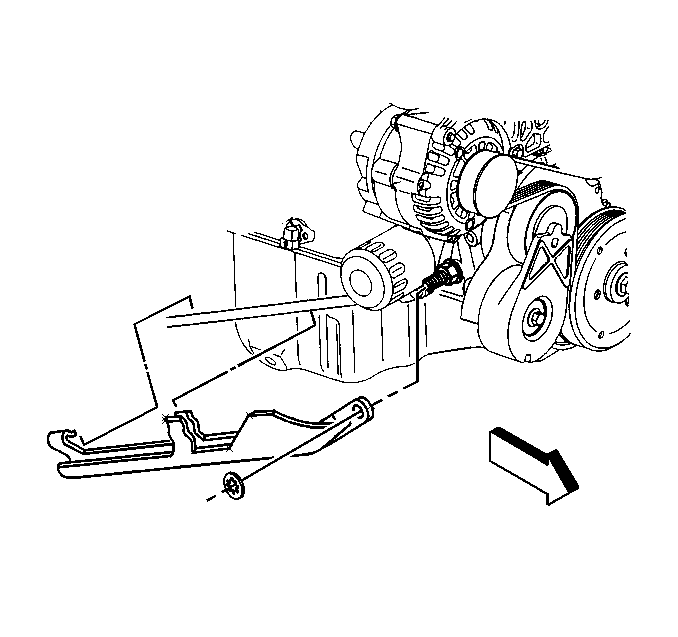
- Remove the oil filter
drain deflector from the brace rod, if equipped.
- Remove the starter motor. Refer to
Starter Motor Replacement
in Engine Electrical.
- In order to gain access to the top transmission bolts, lower the
rear of the transmission after removing the crossmember. The engine and transmission
will pivot on the engine mounts.
- Remove the transmission.
- Disconnect the oxygen sensor electrical connector. Refer to
Oxygen Sensor Replacement
in Engine Controls
2.2L
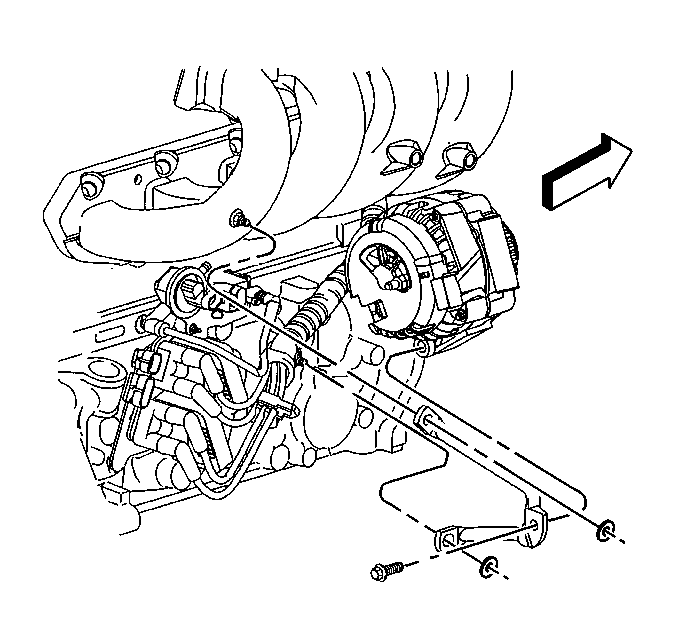
- Remove the right fender
wheelhouse extension. Refer to
Wheelhouse Extension Replacement
in Body Front End.
- Working through the wheelhouse opening, remove the generator rear
brace using the following procedure:
| 12.1. | Remove the bolt from the rear of the generator. |
| 12.2. | Remove two nuts holding the brace to the engine. |
| 12.3. | Remove the brace from the engine. |
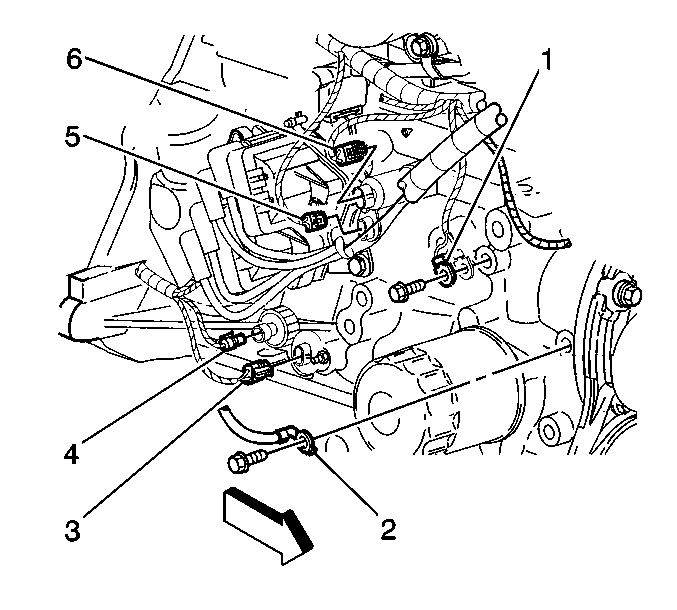
- Remove the bolt holding
the battery negative cable (2) to the engine.
- Remove the bolt holding the ground wires (1) to the engine.
- Disconnect the following electrical connectors:
| • | Engine oil pressure gauge sensor (6) |
| • | Camshaft position (CMP) sensor (5) |
| • | Crankshaft position (CKP) sensor (3) |
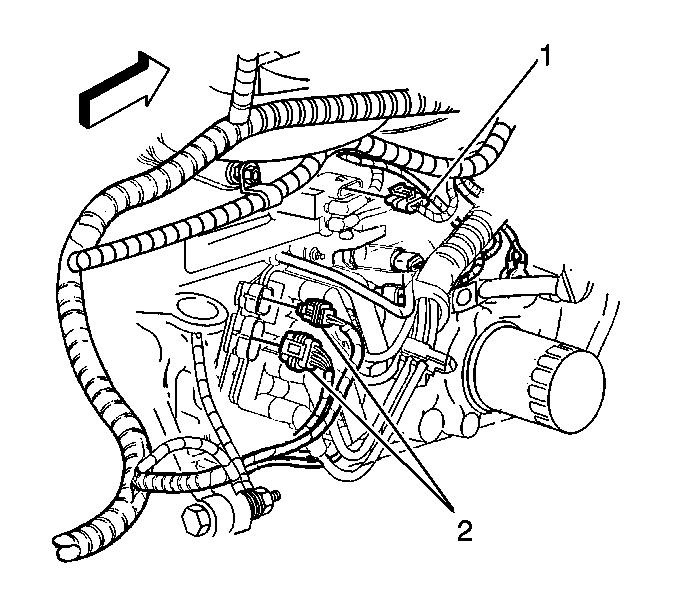
- Disconnect both ignition
control module (ICM) electrical connectors (2).
- Disconnect the EVAP purge canister solenoid valve electrical connector.
- Lower the vehicle.
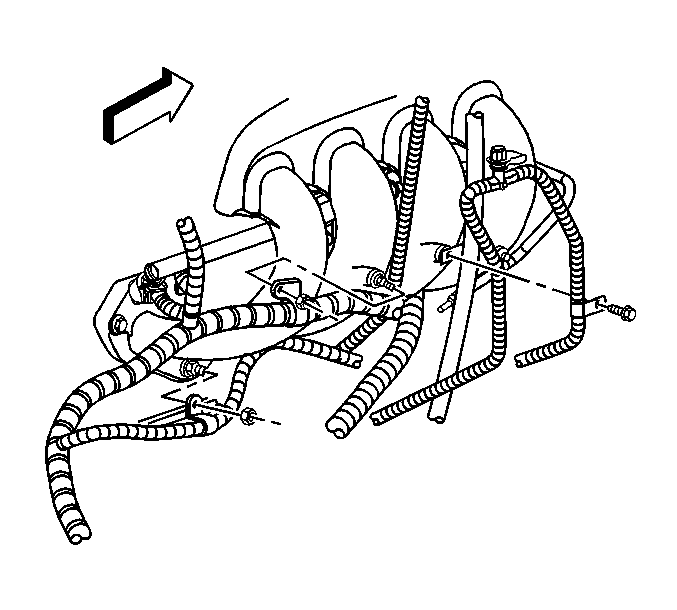
- Remove the bolt holding
the EVAP emission canister purge harness and if equipped the automatic transmission
fluid fill tube to the intake manifold.
- Remove the nut holding the engine wiring harness clip to the intake
manifold.
- Remove the nut holding the engine wiring harness clip to the intake
manifold rear lower stud.
- Remove the air intake duct. Refer to
Air Cleaner Outlet Resonator Replacement
in Engine Controls 2.2L.
- Remove the radiator. Refer to
Radiator Replacement
in Engine Cooling.
- Remove the drive belt. Refer to
Drive Belt Replacement
.
Important: Do not evacuate the A/C system.
- Remove the air conditioning compressor, if equipped, and set it aside.
Refer to
Air Conditioning Compressor Replacement
in Heating Ventilation and Air Conditioning.
- Remove the power steering pump and set it aside. Refer to
Power Steering Pump Replacement
in Power Steering Systems.
- Disconnect both heater hoses from the heater core. Refer to
Heater Hoses Replacement
in Heating Ventilation and Air Conditioning.
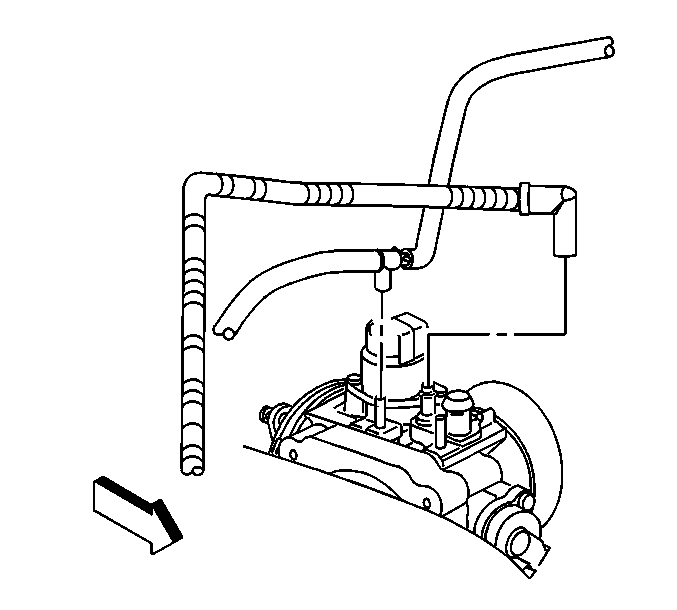
- Disconnect the heating
and air conditioning control vacuum source hose.
- Disconnect the EVAP emission purge tube from the throttle body.
Caution: In order to avoid possible injury or vehicle damage, always replace
the accelerator control cable with a NEW cable whenever you remove the engine
from the vehicle.
In order to avoid cruise control cable damage, position the cable out
of the way while you remove or install the engine. Do not pry
or lean against the cruise control cable and do not kink the cable. You must
replace a damaged cable.
- Remove the accelerator control cable. Refer to
Accelerator Control Cable Replacement
in Engine
Controls 2.2L
- Disconnect the cruise control cable from the throttle shaft. Refer
to
Cruise Control Cable Replacement
in Cruise Control.
- Disconnect the engine side of the battery positive cable from
the mega fuse. Refer to
Underhood Fuse Block Replacement
in Engine Electrical.
- Disconnect the engine coolant heater, if equipped. Refer to
Coolant Heater Replacement
in Engine Cooling.
- Disconnect the electrical connections from the generator. Refer
to
Generator Replacement
in Engine Electrical.
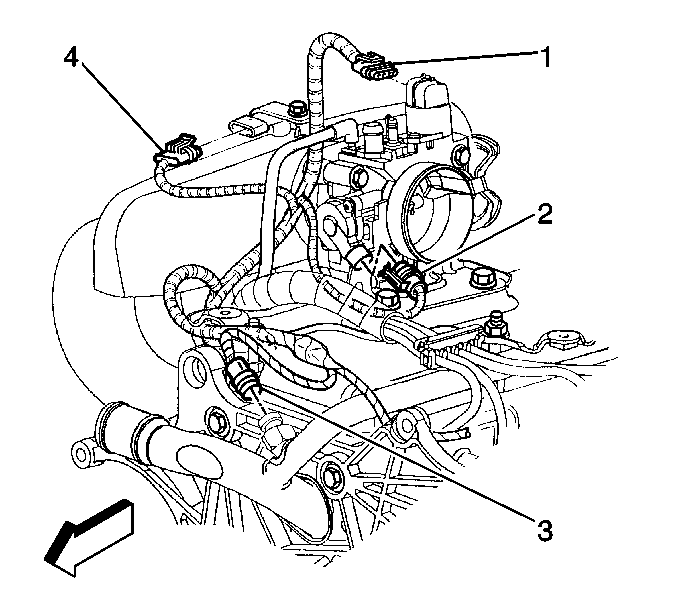
- Disconnect the following
electrical connectors from the top of the engine:
| • | Engine coolant temperature (ECT) sensor (3) |
| • | Idle air control (IAC) motor (1) |
| • | Manifold absolute pressure (MAP) senor (4) |
| • | Throttle position (TP) sensor (2) |
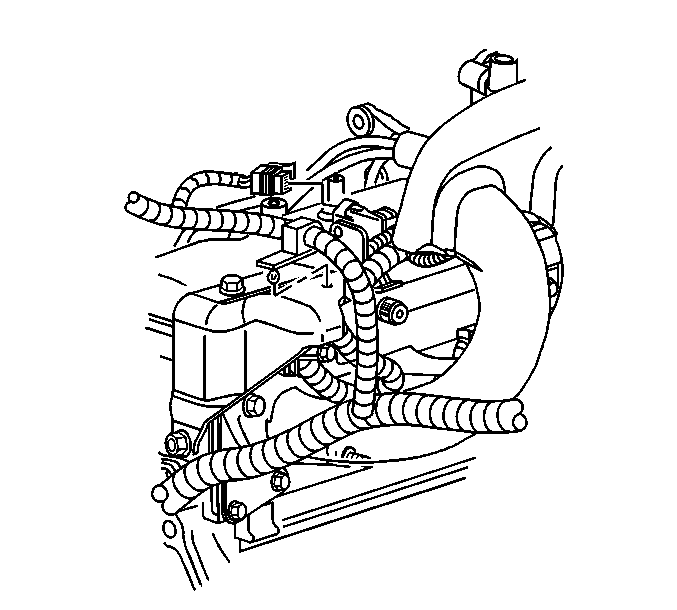
- Disconnect the fuel injector
harness electrical connector.
- Remove the fuel injector harness electrical connector from the
bracket on the valve rocker arm cover.
- Remove the engine wiring harness from the bracket.
- Move and secure the engine wiring harness out of the way.
- Disconnect the fuel hoses. Refer to
Fuel Hose/Pipes Assembly Replacement
in Engine Controls 2.2L.
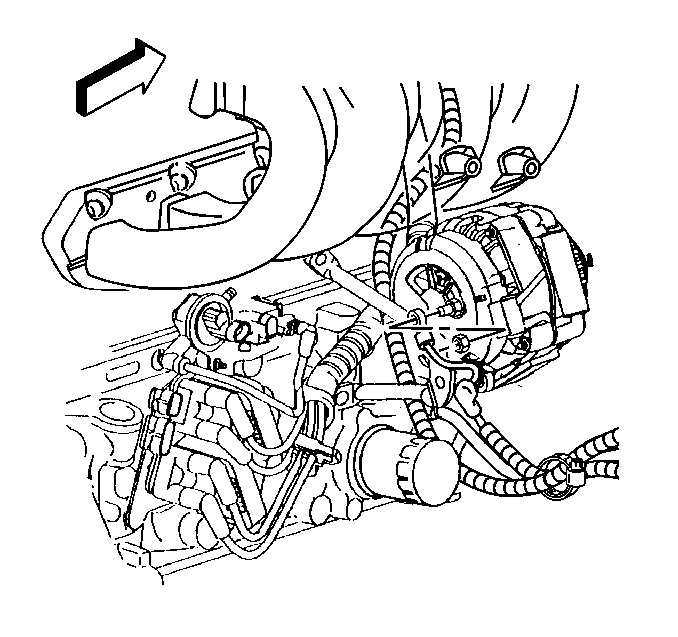
- Disconnect the electrical
connection from the generator.
- Disconnect the generator output wire from the generator.
- Move the engine wiring harnesses aside.
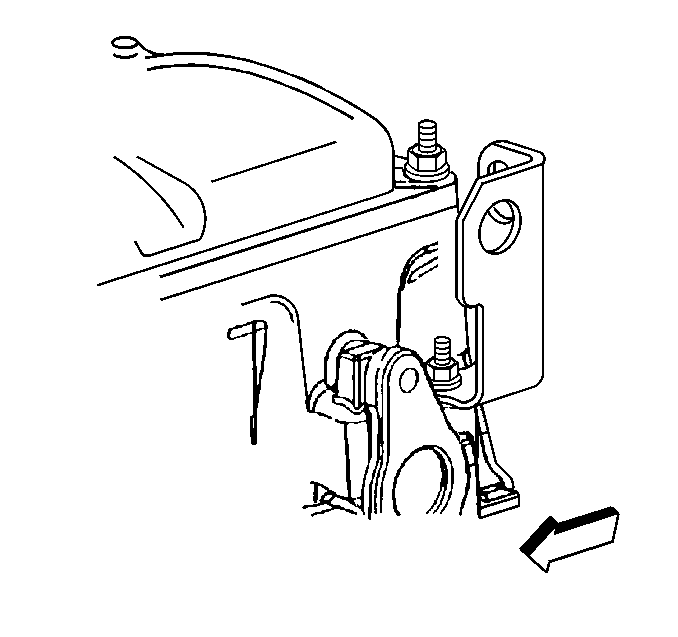
- Install a suitable engine
lifting device to the engine lift brackets.
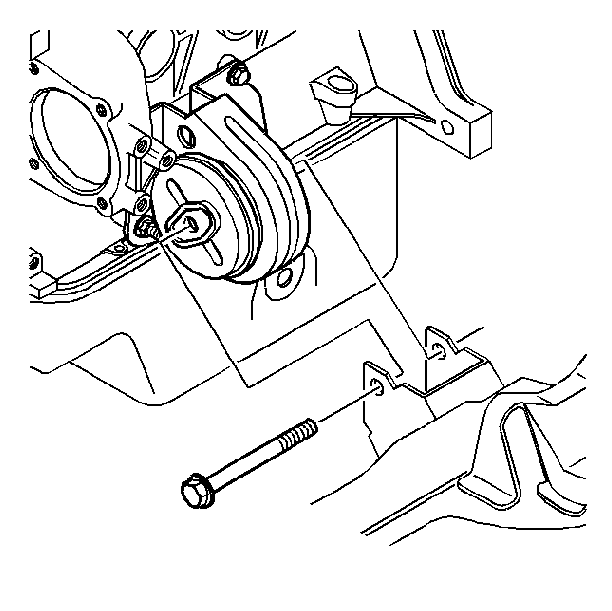
- Remove the left side engine
mount through-bolt.
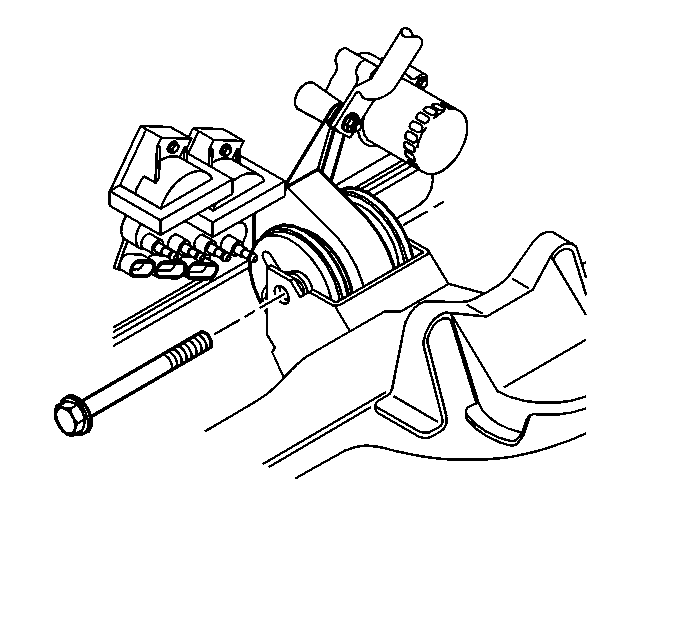
- Remove the right side
engine mount through-bolt.
- Remove the engine from the vehicle.
Installation Procedure
- Install the engine to the vehicle.
- Install the right side engine mount through-bolt. Refer to
Engine Mount Replacement
.
- Install the left side engine mount through-bolt. Refer to
Engine Mount Replacement
.

- Remove the engine lifting
device from the engine lift brackets.
- Connect the fuel hoses. Refer to
Fuel Hose/Pipes Assembly Replacement
in Engine Controls 2.2L

- Position the engine wiring
harness.
- Install the engine wiring harness to the bracket.
- Install the fuel injector harness electrical connector to the
bracket on the valve rocker arm cover.
- Connect the fuel injector harness electrical connector.

- Connect the following
electrical connectors to the top of the engine:
| • | Engine coolant temperature (ECT) sensor (3) |
| • | Idle air control (IAC) motor (1) |
| • | Manifold absolute pressure (MAP) senor (4) |
| • | Throttle position (TP) sensor (2) |
- Connect the engine coolant heater, if equipped. Refer to
Coolant Heater Replacement
in Engine Electrical.
- Connect the generator electrical connectors. Refer to
Generator Replacement
in Engine Electrical.
- Connect the engine side of the battery positive cable to the mega
fuse. Refer to
Underhood Fuse Block Replacement
in Engine Electrical.
Caution: In order to avoid possible injury or vehicle damage, always replace
the accelerator control cable with a NEW cable whenever you remove the engine
from the vehicle.
In order to avoid cruise control cable damage, position the cable out
of the way while you remove or install the engine. Do not pry
or lean against the cruise control cable and do not kink the cable. You must
replace a damaged cable.
- Install a NEW accelerator control cable. Refer to
Accelerator Control Cable Replacement
in Engine
Controls 2.2L.
- Connect the cruise control cable to the throttle body, if equipped.
Refer to
Cruise Control Cable Replacement
in Cruise Control.
- Install both heater hoses to the heater core. Refer to
Heater Hoses Replacement
in Heating Ventilation
and Air Conditioning.
- Install the power steering pump. Refer to
Power Steering Pump Replacement
in Power
Steering Systems.
- Install the air conditioning compressor, if equipped. Refer to
Air Conditioning Compressor Replacement
in
Heating Ventilation and Air Conditioning.
- Install the drive belt. Refer to
Drive Belt Replacement
.
- Install the radiator. Refer to
Radiator Replacement
in Engine Cooling.
- Install the air intake duct. Refer to
Air Cleaner Outlet Resonator Replacement
in Engine Controls 2.2L

- Connect the heating and
air conditioning control vacuum source hose.
- Connect the EVAP emission purge tube from the throttle body.

- Install he bolt holding
the EVAP emission canister purge harness and if equipped the transmission
fluid fill tube.
Tighten
Tighten the bolts to 10 N·m (89 lb in).
- Install the nut holding the engine wiring harness clip and the
battery negative cable clip to the intake manifold.
Tighten
Tighten the engine wiring harness clip nut to 10 N·m (89 lb ft).
- Install the nut holding the engine wiring harness clip to the
intake manifold rear lower stud.
Tighten
Tighten the engine wiring harness clip nut to 30 N·m (22 lb ft).
- Raise the vehicle to a height in order to work through the wheelhouse
opening.

- Connect the following
electrical connectors to the right side of the engine:
| • | Engine oil pressure sensor (6) |
| • | Camshaft position (CMP) sensor (5) |
| • | Crankshaft position (CKP) sensor (3) |
- Install the bolt and the ground wires (1) to the engine.
Tighten
Tighten the ground wire bolt to 35 N·m (26 lb ft).
- Install the bolt and the battery negative cable (2) to the engine.
Tighten
Tighten the battery negative cable bolt to 35 N·m (26 lb ft).

- Connect both ignition
control module (ICM) electrical connectors (2).
- Connect the EVAP purge canister solenoid valve electrical connector
(1).

- Install the generator
brace using the following procedure.
| 33.1. | Install the brace to the engine. |
| 33.2. | Install the two nuts holding the brace to the engine. |
| 33.3. | Install the bolt to the rear of the generator. |
Tighten
Tighten the generator rear brace nuts and bolt to 25 N·m
(18 lb ft).
- Install the right fender wheelhouse extension. Refer to
Wheelhouse Extension Replacement
in Body Front End.
- Connect the oxygen sensor electrical connector. Refer to
Oxygen Sensor Replacement
in Engine Controls
2.2L
- Install the transmission.
- Install the starter motor. Refer to
Starter Motor Replacement
in Engine Electrical.

- Install the oil filter
drain deflector on the transmission brace rod, if equipped.
- Connect the exhaust pipe to the exhaust manifold. Refer to
Exhaust Manifold Pipe Replacement
in Engine Exhaust.
- Lower the vehicle.
- Install the manual transmission shift lever, if removed. Refer
to
Shift Lever Replacement
in Manual
Transmission - NV 1500.
- Install the hood. Refer to
Hood Replacement
in Body Front End.
- Connect the battery negative cable. Refer to
Battery Replacement
in Engine Electrical.
- Fill the crankcase with engine oil. Refer to
Engine Oil and Oil Filter Replacement
- Fill the cooling system with coolant. Refer to
Cooling System Draining and Filling
in Engine Cooling.
- Recharge the A/C system, if equipped. Refer to
Refrigerant Recovery and Recharging
in Heating Ventilation
and Air Conditioning.
- Operate and test the engine. Refer to
Engine Set-Up and Testing
.





















